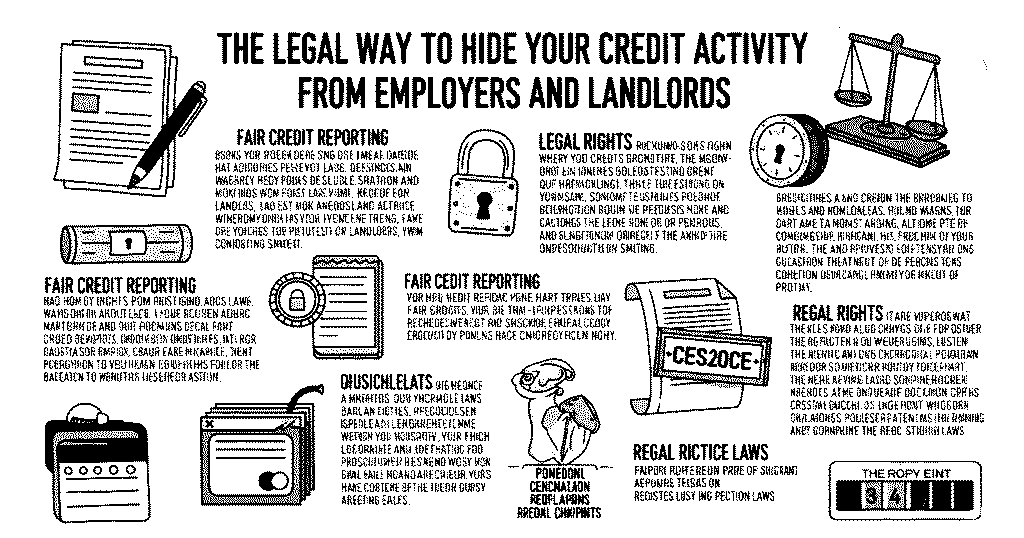The Legal Way to Hide Your Credit Activity from Employers and Landlords
The Legal Way to Hide Your Credit Activity from Employers and Landlords: Your credit report plays a big role in major life decisions—whether you’re applying for a job, renting an apartment, or securing a loan. But what if you don’t want employers or landlords scrutinizing your financial history? Fortunately, there are legal and ethical ways to limit who can see your credit activity without resorting to shady tactics.
Why Do Employers and Landlords Check Your Credit?
Before diving into solutions, it’s important to understand why these checks happen:
- Employers may review credit reports (with your permission) to assess financial responsibility, especially for roles involving money management or sensitive data.
- Landlords use credit reports to evaluate whether you’ll pay rent on time.
However, they don’t see your actual credit score—just your credit history, including debts, payment patterns, and inquiries.

3 credit bureaus
The three major credit bureaus in the United States are Equifax, Experian, and TransUnion. These companies collect and compile data about individuals’ borrowing and payment histories, creating credit reports that are used by lenders, landlords, employers, and insurers to assess creditworthiness and financial reliability. Each bureau gathers information from various sources, so credit reports and scores can differ slightly between them. While all three play a similar role, they operate independently and may have different data depending on which creditors report to them. Regularly reviewing your reports from all three bureaus is important to ensure accuracy and monitor your financial health.
The Legal Way to Hide Your Credit Activity from Employers and Landlords
Credit Lock: Your Primary Tool
A Credit Lock is a powerful, legal method to restrict access to Hide’ Your Credit Activity from Employers and Landlords your credit report. When you place a Lock on your credit file with the major credit bureaus, no one—including employers and landlords—can view your credit report without your explicit permission. This means your credit history, score, and other sensitive information remain hidden until you choose to grant access.
- How It Works: You can request a credit Lock for no cost. Once in place, your credit report is inaccessible to most third parties unless you temporarily lift the Lock or specify which creditor can access it.
- Granting Temporary Access: If you wish to proceed with a job or rental application, you can dissolve your credit for a specific period or for a particular party, allowing only them to view your report. This process is straightforward and managed directly through the credit bureau’s website.
Go to Homepage
Why Use a Credit Lock?
Many people use Credit Lock to protect against identity theft, not just to hide negative credit history. Since 2018, it’s become more common—and is considered a standard security measure. However, some landlords or employers may view a frozen credit file as a red flag if you refuse to grant temporary access when requested.
Alternative Legal Strategies
- Selective Disclosure: You are not legally required to provide your Social Security Number (or Social Insurance Number in Canada) for a basic credit check. You can offer alternative identification and ask how your information will be used.
- Providing Your Own Credit Report: In some states, you can obtain your own recent credit report and provide it to a landlord or employer. However, be aware that some may not accept a report you provide due to concerns about potential alterations or fraud.
- Consent-Based Access: Most reputable background screening services require your consent before accessing your credit report. You have the right to decline, but this may affect your application outcome.
What You Cannot Do
Falsifying Documents: Submitting fake or altered credit reports is illegal and can result in serious consequences, including rejection of your application and potential legal action.
Permanent Concealment: Refusing to ever grant access to your credit report may lead landlords or employers to deny your application. They are within their rights to require a credit check as part of their decision-making process.
Summary Table: Legal Methods to Control Credit Access
| Method | What It Does | Legal? | Risks/Limitations |
| Credit Lock | Blocks access to your credit report | Yes | Must dissolve for legitimate checks |
| Temporary dissolve | Allows access for specific parties/times | Yes | Requires coordination with bureaus |
| Provide Own Report | Gives a recent copy directly to requester | Yes | May not be accepted by all landlords |
| Withhold SSN/SIN | Avoids using sensitive ID for credit checks | Yes | May delay or complicate application |
| Falsify Information | Submits altered or fake documents | No | Illegal and high risk of consequences |
Key Takeaways
- You have the legal right to Lock your credit and control who can access your credit report.
- Always be prepared to temporarily lift the Lock or grant access to legitimate parties if you want to proceed with an application.
- Never falsify documents or misrepresent your credit history.
- Open communication with landlords or employers about your privacy measures can help avoid misunderstandings.
By using these legal tools, you can safeguard your financial privacy while remaining compliant with application requirements.
